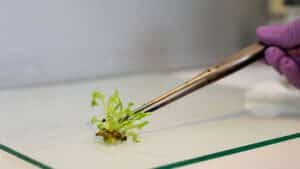Rothamsted scientists have welcomed changes that will make gene editing research much easier from now on.
The new UK legislation, announced by DEFRA today, will remove much of the red tape around the research and development of improved crop varieties using precision breeding techniques such as CRISPR.
Rothamsted Research Director and Chief Executive, Professor Angela Karp said: “This announcement is very welcome news. It will significantly speed up our ability to test enhanced crops in the field. With the triple threats of climate change, a burgeoning human population, and widespread biodiversity loss hanging over us, the sooner we can get more resilient, more nutritious, nature-friendly crops to market the better.”
Her remarks were echoed by two the UK’s leading GE experts.
Professor Johnathan Napier said: “This is a really positive development and I am genuinely excited by the opportunities this shift in the classification of genome editing in plants will bring. I strongly believe that genome editing can contribute to making crops to be more nutritious, more sustainable and more resilient, and this change to how field trials are regulated is a welcome first step in liberalising how the UK regulates new genetic technologies like GE and GM.
“I look forward to being part of this exciting new chapter, one where the UK can better realise its potential as a world leader in plant biotechnology to deliver food security.”
Professor Nigel Halford said: “This is great news, and the first positive step in the regulation of crop biotechnology for two decades.
“It will make it much easier for us to test the low acrylamide wheat lines we are developing in the field, which is essential if we are to find out if they could be suitable for wheat breeders to use. The possibility of low acrylamide wheat products being available to consumers in the future has moved one step closer.”
Source: Rothamsted Research













